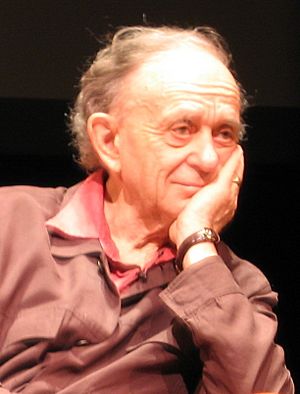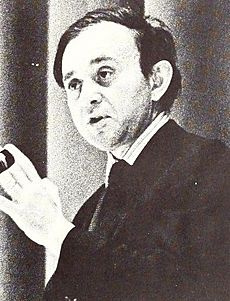Frederick Wiseman facts for kids
Quick facts for kids
Frederick Wiseman
|
|
|---|---|

Wiseman in June 2005
|
|
| Born | January 1, 1930 Boston, Massachusetts, U.S.
|
| Alma mater | Williams College (B.A., 1951) Yale Law School (LL.B., 1954) |
| Occupation | director, producer |
| Years active | 1963–2023 |
| Spouse(s) |
Zipporah Batshaw
(m. 1955; |
| Children | 2 |
Frederick Wiseman (born January 1, 1930) is a famous American filmmaker. He is known for making documentaries and directing plays. His films often explore how different American places and systems work, like schools or hospitals. In 2017, The New York Times newspaper called him "one of the most important and original filmmakers working today."
Contents
Early Life and Education
Frederick Wiseman was born in Boston on January 1, 1930. His parents were Gertrude Leah and Jacob Leo Wiseman. He went to Williams College and earned a Bachelor of Arts degree in 1951. Later, he studied law at Yale Law School, getting his law degree in 1954.
After finishing school, Wiseman served in the U.S. Army from 1954 to 1956. He then lived in Paris, France, for two years. When he returned to the United States, he taught law at Boston University. Soon after, he started making documentary films. He has won many awards for his films, including special fellowships like the Guggenheim and MacArthur fellowships.
What Kind of Films Does Frederick Wiseman Make?
Frederick Wiseman's first full-length film was The Cool World in 1963. After that, he produced and directed Titicut Follies in 1967. Since then, he has produced and directed all his films himself.
His movies are mostly studies of different social places and systems. These include places like hospitals, schools, or police stations. All of his films have been shown on PBS, which is a public TV network and one of his main supporters.
How Does Wiseman Film?
Wiseman's films are often described as "observational." This means he watches and records real life as it happens, without interfering. This style comes from something called "direct cinema." However, Wiseman doesn't really like these terms.
He explained that he tries to edit his films to have a "dramatic structure." This means he carefully chooses and arranges scenes to tell a story or show a point, even if it's not a made-up story. He feels that just "hanging around" and filming everything equally isn't what he does. He also thinks "cinéma vérité" (a French term for "truthful cinema") is a "pompous" term that doesn't mean much to him.
Wiseman sometimes calls his own films "Reality Fictions." This suggests that while they are based on real life, they are still shaped and put together by him, like a story.
In 2016, Wiseman received a special award called the Golden Lion for Lifetime Achievement. This award honors his amazing career in filmmaking. In 2025, Wiseman shared that he was retiring because he no longer had the energy for new film projects.
Frederick Wiseman's Filmmaking Ideas

Frederick Wiseman believes his films show his own experiences and feelings. They are not meant to be completely objective or unbiased pictures of what he films.
He has often said that his films cannot be totally unbiased. This is because making a movie always involves making choices. Even with these choices, he feels he has a duty to show events fairly.
He explained that his films are based on real actions that are not planned or changed. However, the way he edits and films is very much controlled by him. He chooses what to film, how to film it, and how to put it all together. For example, for his film Belfast, Maine, he had 110 hours of footage but only used 4 hours. This shows how much he chooses and compresses the material.
Wiseman believes that every part of making a documentary involves choices, which means it's always shaped by the filmmaker. But he feels it's important to make a film that is "true to the spirit" of what he saw happening. He said his films are "biased, prejudiced, condensed, compressed but fair." He aims for them to be an honest account of his experience while making the movie. He also feels he has a duty to the people in his films to show them fairly.
How Wiseman Makes His Films
Wiseman usually spends about four to six weeks filming in the places he wants to show. He does very little planning beforehand. The biggest part of his work is editing the footage. He spends a lot of time trying to find the right "rhythm" to make the film work.
Every film Wiseman makes has a dramatic structure. This doesn't mean it has a clear beginning, middle, and end like a story with a hero. Instead, the drama comes from each scene. There are no main characters for the audience to connect with. Still, Wiseman believes drama is key for his films to feel like real movies. The way his films are put together helps the audience understand the situations shown. Viewers can feel the tension as different things create difficult situations for the people or subjects in the film.
Wiseman openly says he changes his raw footage to create this dramatic structure. He insists this is needed to "make a movie." He looks for drama in everyday experiences. For example, in his film Public Housing, he found drama in an old man being evicted or an old woman peeling a cabbage.
He also said that the structure of his films is important for their overall message. He tries to figure out how each scene connects to others and how it adds to the film's point of view.
A unique part of Wiseman's style is that he never uses narration (a voice explaining things), interviews, or shows himself or the filmmaking process. He feels there's no need to show his own experience and that showing the filmmaking process can seem self-important.
When making a film, Wiseman often gathers over 100 hours of raw video. His skill in creating interesting, full-length films without narration or interviews, while still being fair, is why he is seen as a master of documentary filmmaking. He explained that editing is a process of thinking through his relationship to the material. This involves a "four-way conversation" between himself, the scene he's working on, his memory, and his general values and experiences.
Film and Theatre Work
Documentaries
| Year | Title | Notes |
|---|---|---|
| 1967 | Titicut Follies | |
| 1968 | High School | |
| 1969 | Law and Order | |
| 1970 | Hospital | |
| 1971 | Basic Training | |
| I Miss Sonia Henie | Short film | |
| 1972 | Essene | |
| 1973 | Juvenile Court | |
| 1974 | Primate | |
| 1975 | Welfare | |
| 1976 | Meat | |
| 1977 | Canal Zone | |
| 1978 | Sinai Field Mission | |
| 1979 | Manoeuvre | |
| 1980 | Model | |
| 1982 | Seraphita's Diary | |
| 1983 | The Store | |
| 1985 | Racetrack | |
| 1986 | Blind | |
| Deaf | ||
| Adjustment & Work | ||
| Multi-Handicapped | ||
| 1988 | Missile | |
| 1989 | Near Death | |
| 1990 | Central Park | |
| 1991 | Aspen | |
| 1993 | Zoo | |
| 1994 | High School II | |
| 1995 | Ballet | |
| 1996 | La Comédie-Française ou l'Amour joué | First French-language documentary |
| 1997 | Public Housing | |
| 1999 | Belfast, Maine | |
| 2001 | Domestic Violence | |
| 2002 | Domestic Violence 2 | |
| 2005 | The Garden | Filmed in 1997, unreleased for eight years |
| 2007 | State Legislature | |
| 2009 | La Danse | |
| 2010 | Boxing Gym | |
| 2011 | Crazy Horse | |
| 2013 | At Berkeley | |
| 2014 | National Gallery | |
| 2015 | In Jackson Heights | |
| 2017 | Ex Libris: The New York Public Library | |
| 2018 | Monrovia, Indiana | |
| 2020 | City Hall | |
| 2023 | Menus-Plaisirs – Les Troisgros |
Other Films
| Year | English Title | Original Title |
|---|---|---|
| 2002 | The Last Letter | La dernière lettre |
| 2022 | A Couple | |
- The Cool World (1963) (producer only)
- Other People's Children (2022) – actor
Theatre Work
Besides his film work, Frederick Wiseman has also directed plays in the US and France.
- Emily Dickinson, La Belle d’Amherst (The Belle of Amherst) by William Luce. Le Théâtre Noir, Paris, Director, May–July 2012
- Oh les beaux jours by Samuel Beckett. La Comédie Française, Paris. Director, November – January 2006; Director & Actor, Jan–March 2007.
- The Last Letter adapted from the novel Life and Fate by Vasily Grossman
- Theatre for a New Audience, New York. Director, December 2003
- North American Tour with La Comédie Française production (Ottawa/Toronto, Canada; Cambridge/Springfield, MA; New York, NY; Chicago, IL) Director, May–June 2001
- La Comédie Française, Paris. Director, March–April 2000, September–November 2000
- Welfare: The Opera, story by Frederick Wiseman and David Slavitt, words by David Slavitt, music by Lenny Pickett.
- St. Anne's Center for Restoration and the Arts, New York. Director, May 1997
- American Music Theater Festival, Philadelphia. Director, June 1992
- American Repertory Theatre, Cambridge. Director, May 1988
- Hate by Joshua Goldstein. American Repertory Theatre, Cambridge. Director, January 1991
- Tonight We Improvise by Luigi Pirandello. American Repertory Theatre, Cambridge. Director of video parts and actor in role of documentary filmmaker, November 1986 – February 1987
Awards and Honors
Frederick Wiseman has received many important awards for his work:
- In 2003, he received the Dan David Prize for his films.
- In 2006, he was given the George Polk Career Award. This award honors people who have made great contributions to honest journalism and investigative reporting.
- In spring 2012, Wiseman was part of the three-month art show called the Whitney Biennial.
- In 2014, he was awarded the Golden Lion for Lifetime Achievement at the 71st Venice International Film Festival.
- In 2016, Wiseman received an Academy Honorary Award from the Academy of Motion Picture Arts and Sciences. This is a special Oscar given for a lifetime of achievement in film.
See also
 In Spanish: Frederick Wiseman para niños
In Spanish: Frederick Wiseman para niños
 | Selma Burke |
 | Pauline Powell Burns |
 | Frederick J. Brown |
 | Robert Blackburn |

